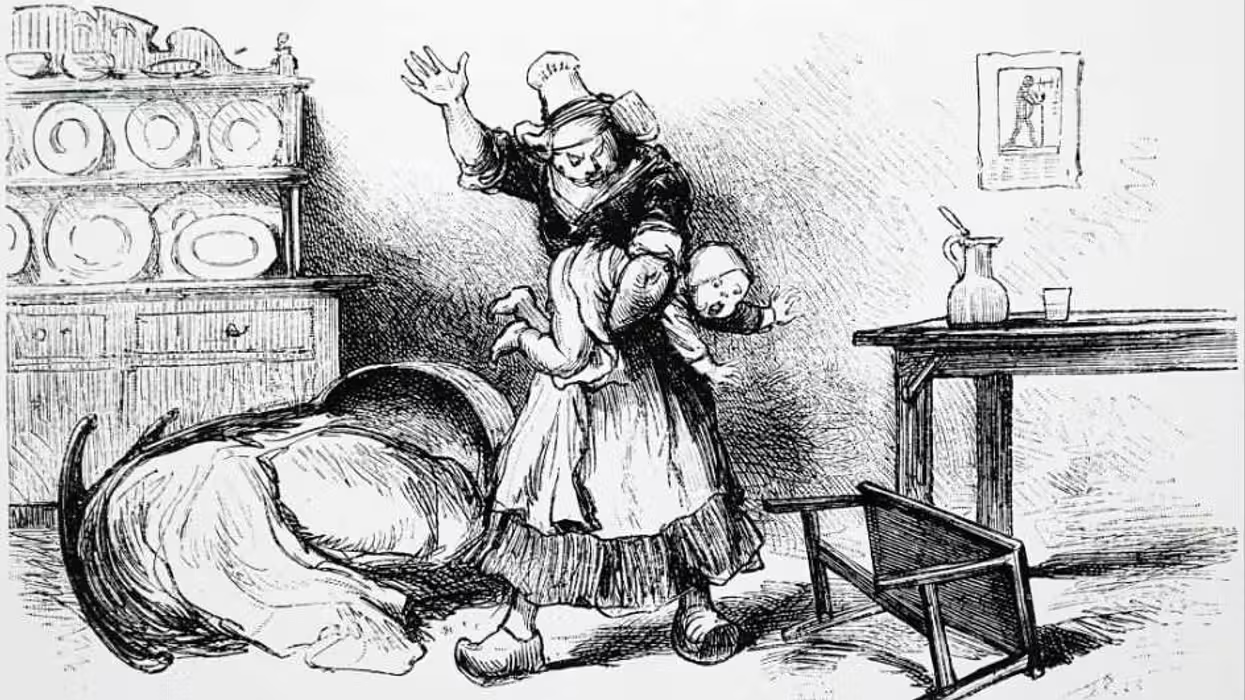
Universal History Archive

Is 'spare the rod, spoil the child' a myth? That's what the latest 'experts' say.
I recently read a new book so steeped in self-righteousness that I contemplated watching a few Barack Obama speeches as a palate cleanser.
"The Myth of Good Christian Parenting," by Marissa Franks Burt and Kelsey Kramer McGinnis, is less a work of theology than a sermon for soft parents — a long sigh bound in paperback. Every page drips with condescension, assuring readers that discipline is outdated, obedience is oppressive, and spanking is somewhere between a sin and a war crime.
Children don’t need friends with car keys. They need moral architects. The parents who fear offending their children will soon be ruled by them.
Their thesis is that corporal punishment has no biblical or moral grounding. Modern parenting should replace the rod with reasoning, the command with conversation. It’s the kind of argument that sounds enlightened until you remember what actual children are like.
RELATED: Blue state punishes Christian parents — but progressive lie crumbles in the process

Children, bless them, are beautiful little anarchists. Left to their own devices, they’d eat cookies for breakfast, lunch, and dinner, go to bed once a month, and discover that the toilet doubles nicely as a Jacuzzi for Legos. They’re not wicked, but they are wild. Civilization begins at the moment a parent says no — and means it. A gentle talk about “boundaries” might work on a golden retriever, but toddlers are not guided missiles of rational thought. They’re tiny tyrants with juice boxes.
That’s why spanking, properly understood, isn’t cruelty but calibration. It reminds a child that choices have consequences, that freedom comes with form. Scripture puts it bluntly: He who spares the rod hates his son. That’s not an endorsement of violence but a defense of reality. Actions have outcomes. Cause meets effect. Love, in its purest form, isn’t permissive; it’s corrective.
Of course, the definition of "violence" has never been more expansive than it is today. Everything is violence now — words, glances, even silence. The modern parent can wound a child simply by saying “no.”
When language is warped like that, meaning vanishes. A light swat becomes indistinguishable from abuse, and firmness becomes indistinguishable from fascism. The result is a generation of parents too frightened of headlines to raise human beings.
What we’ve bred instead are families where authority is on paternity leave and discipline forgot to clock in. Many parents seem desperate to be liked by their children, as if approval were the same as affection. But children don’t need friends with car keys. They need moral architects. The parents who fear offending their children will soon be ruled by them.
I was spanked as a boy — not beaten, but spanked. There’s a world of difference. I hated it at the time, naturally. But I can see now that it taught something far bigger than compliance. It taught that love sometimes hurts, that boundaries aren’t barriers but guardrails. My father didn’t enjoy it, but he did it because he believed my soul mattered more than my sulking. And years later, I thank him for it.
Contrast that with the new model — the “gentle parenting” gospel that treats structure as sadism and guidance as grievance. It produces parents negotiating with toddlers like diplomats in Geneva. “Would you like to stop screaming now, sweetheart, or in five minutes?” Meanwhile, the child is scaling the curtains, painting the dog, and testing Newton’s patience.
Spanking, done calmly and rarely, is not about pain but proportion. It communicates that wrong choices carry a cost and that the world won’t rearrange itself to spare your feelings. A child who learns that lesson young grows into an adult who doesn’t need therapy to survive a stern email.
The irony is that those now crusading against corporal discipline owe their manners to generations who believed in it. The men and women who built the schools, churches, and laws of the modern West were, without exception, raised in homes where clear boundaries existed. They understood that mercy means nothing without justice and love means little without limits.
None of this means children should live in fear. The Christian view of discipline is inseparable from affection. The same hand that corrects should comfort. The difference between abuse and authority lies in motive. The abuser strikes to dominate; the parent disciplines to direct. The point isn’t punishment but perspective, to shape the will without breaking the spirit.
But today, even perspective is suspect. To say a child is wrong is to commit ideological heresy. Every tantrum is “performance art,” every shriek “a statement.” The modern household has become a democracy of one, and its ruler is 4 years old.
When people hear “spanking,” they imagine red faces and raised voices. But in most Christian homes, it’s quieter — a moment of consequence followed by conversation and reconciliation. It’s the living metaphor of moral cause and effect. Pain passes; lessons remain.
A society that forgets that truth doesn’t raise children. If anything, it raises dependents. Kids who mistake correction for cruelty will grow into adults allergic to accountability. They won’t admire their parents’ wisdom; they’ll diagnose it.
There’s nothing barbaric about a well-timed swat on the backside. What’s barbaric is a generation raised without consequences, now stunned to learn that the world still has them.
So no, spanking isn’t the enemy of Christian parenting — it’s one of its oldest allies. It has absolutely nothing to do with humiliation and everything to do with humility.
I read "The Myth of Good Christian Parenting" and discovered the real myth: that you can raise grown-ups without ever acting like one. I hated being spanked when I was six. But watching parents haggle over chores like diplomats and negotiate bedtime like hostage situations, I now consider it an early rescue mission — and, in many ways, an act of mercy.
John Mac Ghlionn
Contributor